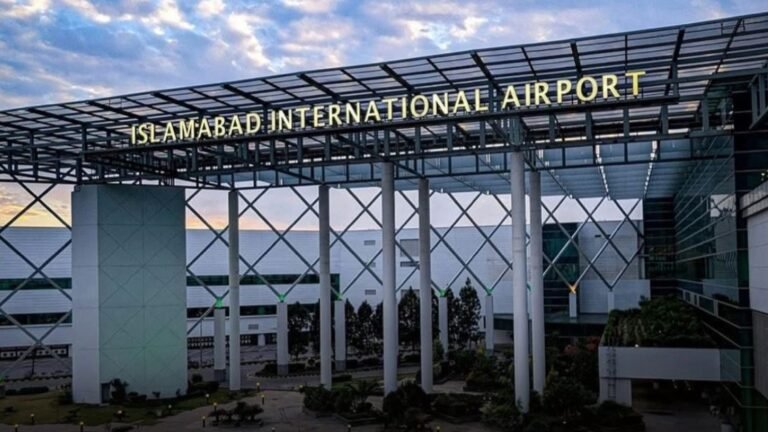In a move that signals a shift in Pakistan’s economic and operational strategy, the Government of Pakistan is preparing to finalize a government-to-government (G2G) agreement with the United Arab Emirates (UAE) for the outsourcing of Islamabad International Airport. This development marks a significant change from the previously proposed open bidding process and is seen as a key part of the country’s ongoing economic reform and privatization efforts.
The plan, currently under review by multiple federal departments, could reshape how Pakistan manages strategic infrastructure, attract international investment, and potentially serve as a model for reforming other state-owned enterprises (SOEs).
Understanding the G2G Agreement: What’s Changing?
Originally, the outsourcing of Islamabad International Airport was expected to go through an open bidding process to ensure competition, transparency, and broader global participation. However, the government has decided to take a direct G2G approach, specifically targeting the UAE for operational control and investment.
The Ministries of Finance, Defence, and Aviation are jointly working on a detailed operational and financial framework. According to official sources, this framework will be:
- Reviewed by the Federal Cabinet
- Shared with the International Monetary Fund (IMF) for compliance and oversight
- Presented to the UAE for negotiation and finalization
This means that rather than opening the opportunity to multiple foreign or local bidders, Pakistan will directly engage with the UAE as a strategic partner — a method that allows quicker execution and potentially stronger bilateral cooperation.
Why the Shift to G2G?
There are multiple reasons behind this decision to adopt a G2G model:
- Speed and Efficiency: Open bidding can be time-consuming, and often leads to delays due to procedural and legal challenges. G2G agreements allow faster implementation.
- Strategic Relations: The UAE has been a long-standing economic partner to Pakistan. Strengthening ties through such agreements may yield long-term benefits, including favorable trade and aid agreements.
- Targeted Investment: A focused agreement ensures that the UAE brings in specialized expertise and targeted investment without getting caught up in red tape or market competition.
- Trust and Accountability: While competitive bidding ensures transparency, G2G deals provide a framework where both parties can negotiate clear terms with state oversight, reducing middlemen and political interference.
Islamabad International Airport: A Key Asset
Opened in 2018, Islamabad International Airport is one of Pakistan’s most modern aviation facilities. Serving millions of passengers annually, it is a critical point for international and domestic air traffic, especially for northern Pakistan.
However, the airport has also faced issues such as:
- Operational inefficiencies
- Overstaffing and lack of automation
- Poor service quality
- Limited commercial revenue generation
The outsourcing plan, under the proposed UAE partnership, aims to upgrade operations, introduce advanced aviation technologies, enhance service delivery, and maximize revenue streams — similar to what has been achieved in airports like Dubai and Abu Dhabi.
Part of a Larger Economic Reform Agenda
The outsourcing of Islamabad International Airport is not an isolated event. It is part of Pakistan’s broader economic reform and privatization program, supported by the IMF and overseen by the Ministry of Finance.
As part of the fiscal roadmap for 2025, at least seven state-owned enterprises (SOEs) are expected to be either privatized or restructured. Key names on this list include:
- Pakistan International Airlines (PIA)
- Islamabad Electric Supply Company (IESCO)
- Steel Mills and other industrial units
This step-by-step reform is designed to reduce the fiscal burden of loss-making enterprises, improve public service delivery, and attract foreign direct investment (FDI) — all key pillars for Pakistan’s economic revival.
IMF’s Role in the Deal
Since Pakistan is under an IMF program, all major structural reforms — especially those involving foreign investment and SOE restructuring — require IMF review and approval. This ensures:
- Fiscal responsibility
- Transparency in process
- Adherence to international best practices
According to officials from the Ministry of Finance, the framework for the G2G deal will be shared with the IMF before it is presented to the UAE, ensuring that the move aligns with Pakistan’s international commitments.
Potential Benefits for Pakistan
If executed well, the G2G outsourcing of Islamabad International Airport could bring several long-term benefits:
- Improved Operational Efficiency: UAE’s experience could lead to enhanced service and global management standards.
- Increased Revenue Generation: More efficient commercial operations and space utilization could turn the airport into a profitable asset.
- Job Creation and Training: The partnership could generate new employment opportunities and skill-building programs.
- Boost in Investor Confidence: A successful model could attract more structured investments in aviation, energy, and transport.
Concerns and Transparency Demands
Despite the potential, critics argue that G2G deals must be executed transparently. Concerns include:
- Lack of competitive bidding may result in undervalued agreements
- Future control of national assets may raise sovereignty concerns
- Public backlash if service levels or pricing are negatively impacted
To address these concerns, transparency in contract terms, public accountability through parliamentary oversight, and clear performance benchmarks will be crucial.
What Comes Next?
The timeline for the agreement is expected to unfold as follows:
- Framework Finalization: Ongoing by the relevant ministries
- IMF Review: To ensure alignment with fiscal reforms
- Cabinet Approval: Likely in the coming weeks
- Formal UAE Engagement: Through diplomatic and business channels
- Implementation: Subject to mutual agreement and logistics
If all goes smoothly, Islamabad International Airport could be under UAE operational management within the current fiscal year.
Final Thoughts: A Strategic Leap or Risk?
Pakistan is at a critical juncture in its economic journey. The decision to hand over airport operations to a foreign country via G2G agreement is bold — and will undoubtedly draw both praise and scrutiny. However, in the face of economic pressures and outdated systems, strategic outsourcing may just be the reform catalyst the country needs.
For this to truly benefit the nation, the deal must be transparent, mutually beneficial, and focused on long-term capacity building. Only then can it serve as a model for responsible, results-driven partnerships that uplift the country’s economy and global standing.



